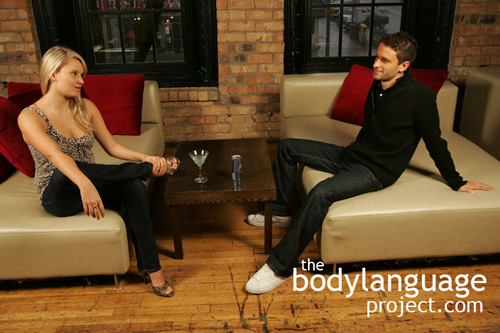Holding dominant body language is like a wedge that holds the door open between levels at your work. When new employees arrive in our companies, even if just a junior level employee, everyone instinctively classifies them. They are either leaders or followers from the start, but it’s not just “something” about them, something mystical or intangible, it is plain and simple, it is their body language that tells us their future roles. We know right away if they will fit into the company, be fired, or come out as future “top dogs.” The research shows us that if you don’t hold dominant body language, you’ll never be promoted to leadership roles. Leaders aren’t usually able to talk their way up a hierarchy, although sometimes they do, and it ends up causing remorse and conflict from lower ranking employees because they lack the respect that comes with dominance and leadership seeming to emanate from certain people. So if you want to get higher in your company here are some tips.
First, increase your height through better posture. Hold your head higher and whenever you can exploit high differences, do it. If everyone is sitting, stand, but don’t make everyone feel uncomfortable by towering over them. If you have split levels, stand on the top level and keep everyone else on the lower rug. Find excuses to stand by volunteering to draw out plans on a board when brainstorming. This gives you two advantages, the first of which is the height advantage where you can tower over your follow employees and the second is more strategic. By being the chalkboard secretary, you become the person that everyone defers to for idea acceptance, while having the freedom to add any ideas yourself as desired without needing approval. Second to exploiting height differences, is breadth expansions. Meaning, one should try to appear bigger by taking up more space. Not only should you spread out your legs and arms, but you should also spread out your papers, pens and other artifacts. Taking up space is a way to own more of it, and is a strong signal of dominance.
Your gaze should be serious and direct, with your head held high. Don’t be afraid to use touch, but touch only in safe zones such as the arm between the hand and elbow, the elbow itself and sometimes the shoulders but only with caution. If you can get away with shoulder or back touches, do so, but pay attention to the reaction is creates so as not to insult others. Always try to be the first to speak and be the “go-to-guy” for questions and opinions. It is therefore important to be helpful, task oriented, and sincerely try to do a good job. Avoid smiling too much especially if you are a woman, as this can be taken as submission or placation. A neutral face is more appropriate during high tension situation so fight the urge to smile nervously and only nod in agreement with statements you really agree with. In other words, don’t smile and nod while expressing negative ideas as it only serves to confuse others, and can make people think you are weak and easily manipulated. Keep your body language in tune with your verbal words and don’t be afraid to cast judgments on solutions you feel are inappropriate. Conversely use encouragement when deserved and back it up with genuine body language.
While body language alone won’t guarantee a raise in dominance, it’s a good first step. The next part of the process is an attitude overhaul while remaining consistent. A word of caution is a must. If you are working within an existing environment where your behaviour will be monitored throughout the process rather than entering a novel environment where people have no baseline to compare you to, be prepared for some resistance. Understand that you are sure to cause resentment, which might create a desire to undermine you, but the last thing you need in your quest for a higher rank are lower dissenters so always treat others with the respect they deserve – even if they don’t deserve it! Upward movement while others stagnant, can be perceived as a threat, create animosity, and more than likely bread challenges. Your task to leadership will be to meet these challenges with consistent and unwavering body language.





